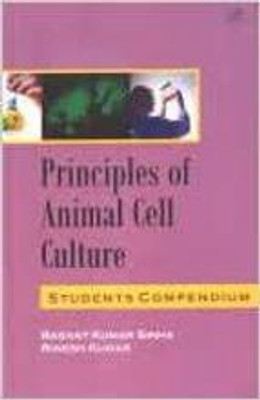Principles of Animal Cell Culture Students Compendium 1st Edition(English, Hardcover, Basant Kumar Sinha, Rinesh Kumar)
Quick Overview
Product Price Comparison
Animal cell culture is playing a pivotal role int e various modern researches. Though the foundation stone of animal cell culture was laid for the isolation and characterization of different viruses but the recent development developments in the field of Biotechnology and Molecular biology have given various new dimension to this technology. Cell culture has provided a new tool for the better understanindg of diagnosis and molecular biology in many areas of biological systems including bacterial, viral and parasitic diseases. The different cell culture are being used in virology for te last five decades and one of its application has been utilized successfull in various types of vacine production. To quote virologist Payton Rous "of late we have begun to study viruses not only for what they themselves mean, but for what they can reveal about the intrinisc cell structure, and function through located injuries that they do". More recent discoveries such as production of various proteins and enzymes through recombinant DNA technology require the use of cell culture to study the exact gene expression, have fully utilized where the available evidences justify it and where their use is consistent with the effort involved and their routine application is recommended. With the advancement in tissue culture technology, scientists are now on the threshold of bringing sea changes in improving the life of human as well as livestock and thus it has become a source of unending fascination for different scientists. The present work is directed primarily to the students of biotechnology, keeping in view the University Grants Commission syllabus on animal cell culture prescribed for vocation course both for undergargraduate and postgraduate students and also for the scientists in the Medical, Veterinary and Biological sciences, whose curiosity and efforts are responsidling to the stimulus of current interest in biotechnology. This book contains 20 and each chapter has been written keeping in view of recent information on the subjects. Portion of the book have evolved through use of several lecture materials in courses which I have delivered in various colleges of Bihar and Jharkhand state having vocational courses in biotechnology. In different college, where I used to devlier lecture, I found that students are facing diffculty for want of a concise book on animal cell culture, which covers their full courses and thus I decided to write this book. This notes give information to student sthey need to know in a handy and succinct format without overwhelming them with unnecessary jargon. It is hoped that it may have some value as a source of providing more readily obtained information on different topices. It is expected that some deficiencies might have persisted in this book, it is anticipated that these deficiencies may be eliminated by diligent supplementingreadings and by classroom lecture materials. Though this is the first endeavour, constructive critcism will be welcomed by the author to be included in the next edition. About the Author Dr. B K Sinha, Retd. University Professor & Head Department of Microbiology, Bihar Veterinary College, Patna, Bihar, India, obtained his Postgraduate and Ph.D. degree in Microbiology from All India, obtained his Postgraduate and Ph.D degree in Microbiology from All India Institute of Medical Sciences (AIIMS), New Delhi and Harynana Agriculture University, Hissar respectively. He has forty years of teaching experience both at UG and PG level and guided several M.Sc. students in Microbiology. He is also the visiting professor in Immunology and Biotechology in different university of Bihar and Jharkhand state and used to teach immunology, Animal cell Biotechnology. He has also a brilliant career in research and handled several research projets funded by Indian Council of Agricultural Research (ICAR) and National Agriculture Technology Project (NATP), New Delhi, government of India. He has publised more than hundred research papers in National and international journal of repute. Several awards have been won by him such as the prestigious Hamdard National Foundation Award for best research in Immunology, Academic Promotion Award and award for distituished services at Rajenda Agricuture Uviversity, Pusa. Dr. Rinesh Kumar is an young and dynamic scientits working as Jr. Research Officer at Insitute of Animal Health and Production, Patna - 800014.. He has done his master degree in veterinary Parasitology and has varied interest in science and expert communication skill. His flair for wide ranging reading and research resulted in his contributing many chapters in books, research articles in reputed journal and popular writings on scienfic and current issues in new papers. He also presented several papers in many seminars and conferences of biotechnology. To quench his appetite for knowledge, presently he is pursuing his study for Doctor of Phiolosphy in Veterinary Parsitology at Indian Veterinary Research Institute, Izatnagar, Bareilly, U.P., a prestigous institute of Veterinary Science of Asia. Table of Contents History of development of cell culture Natural surrondings of animal cell Metabolic capabilites of animal cell Simulating natural conditions for growing animals cells Serum and serum free media Cell culture system Secondary culture: Transformed animal cell Commonly used cell lines and their uses Growth kinetics of cells in culture Gene expression and application of animal cell culture for its studies Organ culture Transfection Cell fusion Selectable marker and antibiotic resistance Hybridoma and monoclonal antibodies Transplantation of cultured cell diefferentation of cells Transgenesis and transgenic animals Apoptosis, Necrosis, Senescence and Quiescence Embryo transfer technology Refernces Index


